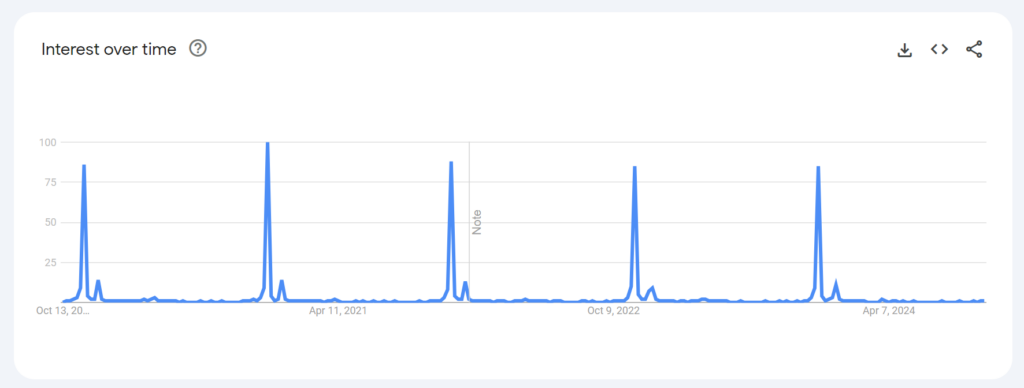Search volume is one of the primary metrics to consider when choosing a good keyword to target. So what happens if keyword research tools tell you that a keyword has low search volume? Is that keyword still worth writing about? Low volume keywords can still be beneficial to your overall SEO and marketing strategies. Let’s talk about how to approach those keywords with low search volume!
What is Search Volume
First, a quick refresh on what search volume means. Search volume is an estimation of how many people search for a specific keyword in a search engine (like Google) over a given time period. Typically, the time period referenced is one month.
Think of search volume like a popularity score. A high volume number means that the keyword or keyword phrase is typed into the search bar a lot; it’s popular and being Googled frequently. A low volume means that very few, if any, people are typing that keyword into the search bar.
Why does low search volume matter to SEO?
So how does search volume impact your SEO? The purpose behind SEO is to get a website shown to lots of people online. The more people that click over to your website, also referred to as “traffic,” the higher the potential is for getting leads, bookings, sales, etc.
Less traffic = Low income potential
More traffic = Higher income potential
Not every website visit results in a conversion or income-generating action (even though we’d like it to). So, to increase the likelihood of website traffic equaling success, you need to generate as much traffic to your website as possible. If your SEO strategy is solely centered around low search volume keywords, the amount of traffic coming to your site will also be low. Ultimately, this makes your website and SEO less effective and less profitable for your business.
What is a “good” Search Volume?
There is not a one-size-fits-all answer to what good or bad search volume looks like. The numbers that you should expect to see vary greatly depending on the industry, niche, time of year, etc. For example, take a look at the Google Trends chart below for the keyword phrase “how long to roast a turkey” over a 5 year period.

There are big changes in the search volume! The volume jumps way up around Thanksgiving, drops back down after the holiday, raises again around Christmas time, and then almost flatlines. This is an example of a keyword phrase with relatively low volume for most of the year, but great potential for specific timeframes.
The search volume of a location-based service can also vary significantly. Looking at the keyword research screenshot below, there is a big difference in the monthly search volume for people looking for a wedding photographer in Tucson versus that same service in Los Angeles.

What I’m getting at here is that there really isn’t a “good” search volume rule of thumb. There are too many variables. Ideally, I encourage my SEO clients to target keywords that have a search volume of at least 100 monthly searchers. If the volume is too low, the effort might not be worth your time in the long run.
If you want some tips on how to pick your main keyword, check out my “How to Start with SEO” blog post!
How to Determine the Search Volume of a Keyword
I mentioned at the beginning of this post that volume is only one metric that you’ll want to look at. But how do you find out if the search volume of a keyword is low? That’s where keyword research tools come in. There are dozens of options out there, all with different price points and features. A few of my favorites are Keywords Everywhere, Semrush, and Google Keyword Planner.
Search Volume numbers, along with a competition or difficulty store, are standard metrics provided with all of these tools.
Why Search Volume Might Be Low
I’ve already shown you that search volume numbers can vary greatly depending on several factors. However, there are other considerations aside from the time of the year and location size that can contribute to a low search volume.
Newness
If the keyword that you’re wanting to writing about is a very new idea, keyword research tools will probably show a zero or very low search volume.
A great example of this (I hate to admit) is COVID. Before 2020, this term didn’t even exist! Keyword research tools weren’t collecting data on this term as soon as it was coined. So if you would’ve looked up the volume for this term in late February 2020 right after the World Health Organization mentioned it, keyword research tools would have shown a search volume of zero. But the country was panicking. Tons of people were looking up this term to learn more. It wasn’t until this new word started to grow in popularity that keyword research tools caught on and started tracking it.
The Research Tool’s Database
Keyword research tools are showing you organic search volume data; in other words, what people are typing into search bars. But each keyword research tool collects information from multiple sources to then put into their database.

Some tools may only reference Google search data while others may also factor in Amazon and YouTube search data, as well.
Controversial Viewpoints
Perhaps the keyword phrase that you want to target is in opposition to the status quo. Maybe you’re a recipe blogger who writes about popular desserts. The consensus in the baking industry is that granny smith apples are best for apple pie recipes. But maybe you love your recipe that uses golden delicious apples instead.
It should be no surprise then that the search volume for an apple pie recipe using golden delicious apples will be much lower simply because it goes against the “best practices.”
The Compounding Effect of Low Search Volume
While a single low search volume keyword may provide you with a small amount of website traffic, these small traffic numbers can add up to real value. 25 searchers per month may not sound like a lot. But when you have 5 pages on your website/blog ranking well on Page 1 and they all bring in 25 searchers per month, you’ve already increased your traffic to 125 potential website visitors.
That’s where the power of SEO comes in. Your website or blog isn’t mean to only target one keyword phrase. Every page or post can target a separate keyword phrase, getting more and more eyeballs on your business!
What to do if Search Volume is Low and Difficulty is High
Another metric served up alongside volume is a difficulty score. This can also be referred to as the “SEO difficulty” or “Competition” score. Essentially, this number is trying to tell you how hard it might be for you to rank a page for this keyword phrase based on other websites that are currently ranking well for that same keyword.

In the case where you have a keyword with low volume AND a high difficulty score… this is when I’d urge you to put that keyword idea to the side and write about something else. A keyword with low search volume already has a smaller return on your investment. Why would you want to work even harder to rank well for a keyword that’s super competitive when it isn’t going to bring lots of traffic to your website?
In short, focus on keyword ideas with a higher search volume and lower difficulty first. Then come back to this particular idea later if you’re still really excited to write about it.
The Caveat: When Strategy Trumps Low Search Volume
Strategy should have some weight on whether or not you write about this topic now, later, or never. If a very strategic keyword phrase has low search volume, it might still be worth your time. I’m going to use the wedding industry as an example.
If you’re a wedding photographer who wants to bring more potential leads and you’re located in a smaller city/town, it’s highly likely that the keyword phrase of “[your city] wedding venues” has a low search volume, possibly less than 100. But looking for a wedding venue is one of the first things a couple does during the wedding planning process.
Being found for this keyword would get you solid, well-matched leads in your wedding business. This is a highly strategic keyword to be found for. Even if the search volume was under 50 searches per month, I’d still encourage a wedding pro to blog about it! Occasionally, great strategy has to override those small search volume numbers.
Google also offers up some advice on what to do when dealing with low volume keywords. My recommendation is to make these low search volume keywords a small part of your SEO and content strategy. Prioritize topics centered around keywords with a higher search volume paired with a low-mid competition score. I provide suggestions on how often you should blog in this post.
*You can still get meaningful and profitable engagement from other sources outside of SEO/organic search, such as social media, Pinterest, and email subscribers. Make sure to share your content on those other platforms as well to encourage more traffic to your website!


Christy Hunter is an SEO specialist for creatives and other small businesses. She offers several types of SEO audits as well as Done-for-You SEO services. Her tips and education have been featured by publications like GoDaddy and Marketer Interview as well as by photography educators like Katelyn James and Hope Taylor. She is passionate about helping business owners finally understand SEO and helping them grow their business with organic search.

Always cheering you on,
Christy
Be the first to comment